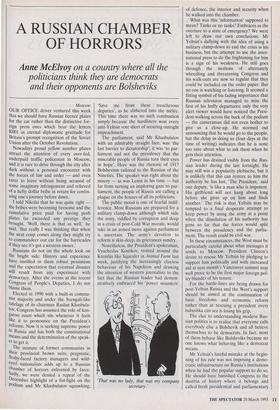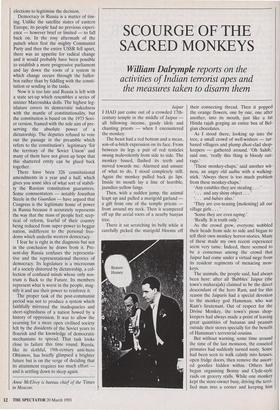A RUSSIAN CHAMBER OF HORRORS
Anne McElvoy on a country where all the
politicians think they are democrats and their opponents are Bolsheviks
Moscow OUR OFFICE driver ventured this week that we should have Russian licence plates for the car rather than the distinctive for- eign press ones which bear the letters 1(001 in eternal diplomatic gratitude for Britain's prompt recognition of the Soviet Union after the October Revolution.
Nowadays proud yellow number plates attract the attention of every over-fed, underpaid traffic policeman in Moscow, and it is rare to drive through the city after dark without a personal encounter with the forces of law and order — and even rarer to leave without being accused of some imaginary infringement and relieved of a hefty dollar bribe in return for contin- uing one's journey before dawn.
I told Nikolai that he was quite right the bribes were becoming tiresome and the cumulative price paid for having posh Plates far exceeded any prestige they brought. 'Well, there is that as well,' he said. 'But really I was thinking that when the next coup comes along they might try to commandeer our car for the barricades if they see it's got a western owner.'
Russians do not on the whole look on the bright side. History and experience have instilled in them robust pessimism and the expectation that eventual disaster will result from any experiment with democracy. After the events at the recent Congress of People's Deputies, I do not blame them.
Elected in 1990 with a built-in commu- nist majority and under the Svengali-like tutelage of its chairman Ruslan Khasbula- tov, Congress has assumed the role of kan- garoo court which sits whenever it feels like it to pronounce on the President's reforms. Now it is seeking supreme power in Russia and has both the constitutional means and the determination of the speak- er to get it.
The mixture of former communists in their provincial brown suits, pragmatic, fleshy-faced factory managers and wild- eyed nationalists adds up to a Russian chamber of horrors enlivened by farce. Sadly, we were denied a repeat of the December highlight of a fist-fight on the Podium and Mr Khasbulatov squawking, `Save me from these treacherous deputies', as he slithered into the mêlée. This time there was no such combustion simply because the hardliners won every anti-Yeltsin vote short of securing outright impeachment.
The parliament, said Mr Khasbulatov with an admirably straight face, was 'the last barrier to dictatorship'; it was 'to par- liament and not the presidency that the miserable people of Russia turn their eyes in hope'. Here was the rhetoric of 1917 Bolshevism tailored to the Russian of the Nineties. The speaker was right about the misery — as was Lenin in his time — but far from turning an imploring gaze to par- liament, the people of Russia are calling a plague on the houses of all its politicians.
The public mood is one of fearful indif- ference. Most Russians are prepared for a military clamp-down although which side the army, riddled by corruption and deep in a crisis of post-Cold War morale, would take in an armed move against parliament is uncertain. The army's devotion to reform is skin-deep, its grievances sundry.
Nonetheless, the President's spokesman, Vyacheslav Kostikov, trotted around the Kremlin like Squealer in Animal Farm last week, justifying the increasingly clueless behaviour of his Napoleon and drawing the attention of western journalists to the fact that the Russian leader had demon- stratively embraced his 'power ministers' `That was no lady, that was my company secretary.' of defence, the interior and security when he walked into the chamber.
What was this 'information' supposed to mean? Tanks or no tanks? Embraces as the overture to a state of emergency? We were left to draw our own conclusions. Mr Yeltsin's dallying with the idea of using a military clamp-down to end the crisis is his business, but the attempt to use the inter- national press to do the frightening for him is a sign of his weakness. He still goes through the motions of alternately wheedling and threatening Congress and his walk-outs are now so regular that they could be included on the order paper. But no one is watching or listening. It seemed a fitting symbol of his fading importance that Russian television managed to miss the first of his huffy departures; only the very alert viewer would have noticed the Presi- dent walking across the back of the podium — the cameraman did not even bother to give us a close-up. He stormed out announcing that he would go to the people, but the delay in doing so (four days at the time of writing) indicates that he is none too sure about what to ask them when he gets their attention.
Power has drained visibly from the Rus- sian leader during the last fortnight. He may still win a popularity plebiscite, but it is unlikely that this can restore to him the authority he has lost. 'The President,' said one deputy, 'is like a man who is impotent. His girlfriend will not hang about long before she gives up on him and finds another.' The risk is that Yeltsin may be tempted to a final desperate attempt to keep power by using the army at a point when the dissolution of his authority has gone so far that the forces would split between the presidency and the parlia- ment. The result could be civil war.
In these circumstances, the West must be particularly careful about what messages it sends to Moscow. President Clinton's desire to rescue Mr Yeltsin by pledging to support him politically and with increased aid at next month's Vancouver summit may well prove to be the first major foreign pol- icy blunder of his tenure.
For the battle-lines are being drawn for post-Yeltsin Russia and the West's support should be aimed at the continuation of basic freedoms and economic reform rather than at rescuing a president every babushka can see is losing his grip.
The clue to understanding modern Rus- sian politics is to realise that everyone calls everybody else a Bolshevik and all believe themselves to be democrats. In fact, most of them behave like Bolsheviks because no one knows what behaving like a democrat means.
Mr Yeltsin's fateful mistake at the begin- ning of his rule was not imposing a demo- cratic infrastructure on Russia's institutions when he had the popular support to do so. He should have banished Congress to the dustbin of history where it belongs and called fresh presidential and parliamentary elections to legitimise the decision.
Democracy in Russia is a matter of tim- ing. Unlike the satellite states of eastern Europe, its people had no previous experi- ence — however brief or limited — to fall back on. In the rosy aftermath of the putsch when first the mighty Communist Party and then the entire USSR fell apart, there was an appetite for radical change and it would probably have been possible to establish a more progressive parliament and lay down the roots of a system in which change occurs through the ballot- box rather than by fiddling with the consti- tution or sending in the tanks.
Now it is too late and Russia is left with a state set-up which resembles a series of sinister Matroushka dolls. The highest leg- islature covers its democratic nakedness with the mantle of constitutionality, but the constitution is based on the 1973 Sovi- et version, framed with the sole aim of pre- serving the absolute power of a dictatorship. The deputies refused to vote out the passage in the preamble which refers to the constitution's legitimacy 'fkir the territory of the Soviet Union' and many of them have not given up hope that this shattered entity can be glued back together.
There have been 326 constitutional amendments in a year and a half, which gives you some idea of what sort of stabili- ty the Russian constitution guarantees. Some commentators — notably Jonathan Steele in the Guardian — have argued that Congress is the legitimate home of power in Russia because it accurately represents the way that the mass of people feel: scep- tical of reform, fearful of their country being reduced from super-power to beggar nation, indifferent to the personal free- doms which underlie western democracy.
I fear he is right in the diagnosis but not in the conclusion he draws from it. Pre- sent-day Russia confuses the representa- tive and the representational theories of democracy. Its legislature is a microcosm of a society distorted by dictatorship, a col- lection of confused minds whose only nos- trum is Back to the Future. Its members represent what is worst in the people, mag- nify it and use their power to reinforce it.
The proper task of the post-communist period was not to produce a system which faithfully mirrored the inadequacies and short-sightedness of a nation bowed by a history of oppression. It was to allow the yearning for a more open civilised society felt by the dissidents of the Soviet years to flourish and the knowledge of democratic mechanisms to spread. That task looks close to failure this time round. Russia, like its slothful, 19th-century anti-hero Oblomov, has briefly glimpsed a brighter future but is on the verge of deciding that its attainment requires too much effort and is settling down to sleep again.
Anne McElvoy is bureau chief of the Times in Moscow.



























































 Previous page
Previous page